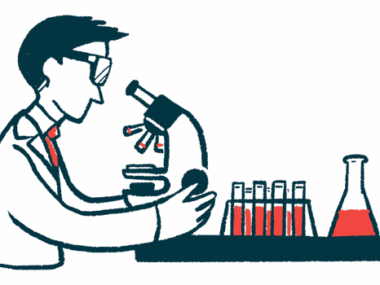Soleno Therapeutics Presents Positive Data on DCCR, its Candidate Therapy for Prader-Willi Syndrome
Written by |

Soleno Therapeutics presented data supporting the clinical benefits of its treatment candidate diazoxide choline controlled-release (DCCR) in patients with Prader-Willi syndrome (PWS).
Specifically, researchers showed that DCCR reduces hyperphagia — an abnormally increased appetite and a hallmark of PWS — by triggering potassium channels in certain nerve cells. Moreover, DCCR was as safe as the previously widely used diazoxide compound.
The results were presented Oct. 4 at the 2018 Foundation for Prader-Willi Research Annual Conference (FPWR) in Las Vegas.
DCCR is an oral, extended-release formulation of diazoxide — a potassium channel opener — designed for once-daily dosing. The drug has shown promise in addressing hyperphagia, as well as other PWS symptoms including aggressive/destructive behaviors, increased fat mass, and abnormal fat (lipid) profiles.
New data suggest that hyperphagia is driven by the excessive release of two neurotransmitters — the neuropeptide Y (NPY) and agouti-related protein (AgRP), two potent stimulators of feeding — by nerve cells that express NPY, AgRP and GABA (another neurotransmitter). These nerve cells are known as NAG neurons.
In the presentation, titled “DCCR-mediated agonization of the ATP-sensitive potassium channel: A proposed mechanism of action to treat hyperphagia in PWS patients,” Neil Cowen, PhD, senior vice president of drug development at Soleno Therapeutics, talked about how DCCR lowered the release of NPY and AgRP, thus reducing hyperphagia in several animal models with the condition.
DCCR does this by directly activating potassium channels in NAG neurons, inhibiting the release of NPY and AgRP.
These data are in agreement with results from a previous preclinical study and a Phase 1/2 clinical trial (NCT02034071) that showed treatment with DCCR significantly decreased fat mass and hyperphagia, and increased lean body mass in animal models and PWS patients.
Moreover, the data support the placebo-controlled Phase 3 trial (NCT03440814), ongoing at seven U.S. sites, investigating the changes in hyperphagia and body fat mass in 105 PWS patients age 4 and older.
“These results indicate that DCCR targets the underlying neural mechanisms of hyperphagia in PWS. Published preclinical and Phase II clinical data provide evidence-backed rationale for DCCR treating hyperphagia in this patient population,” Anish Bhatnagar, MD, chief executive officer of Soleno Therapeutics, said in a press release.
Also at FPWR, a poster presentation by researcher Jennifer Abuzzahab, MD at Children’s Hospitals and Clinics of Minnesota showed that once-daily dosing of DCCR is as safe as diazoxide delivered as an oral solution. Diazoxide is a potassium channel activator on which DCCR formulation is based. The poster was titled “Safety Profile of DCCR and Implications for PWS Study Design.”
Researchers also reported that the frequency and severity of adverse events could be reduced by performing dose titration of DCCR. This procedure is included in the ongoing Phase 3 study.
“The safety and dosing findings from eight clinical studies of DCCR further demonstrate DCCR’s well-established safety profile and the benefit of dose titration, which was utilized in our Phase 2 PWS study and is incorporated into our Phase 3 trial,” Bhatnagar said. “The data presented on DCCR at this year’s FPWR continue to support the design of our ongoing Phase 3 trial.”
For more information about this Phase 3 trial and how to participate, go here.





